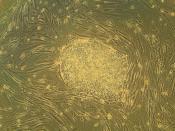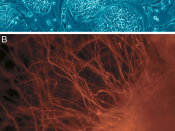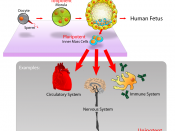Embryonic Stem Cell Research
A new advance in technology that seems to make itself the topic of talk show round tables and dinner tables is embryonic stem cell research. With supporters and detractors on both sides of the issue, it is clear that this controversial procedure will continue to encourage debates whether it be on television, in newspapers, or just between humans in general. The ingenuity of this scientific advancement shows promise in the future by helping find cures for devastating illnesses such as heart disease, diabetes, cancer, Parkinson's Disease, Alzheimer's, and many other disorders.
To better comprehend the full magnitude of this type of research, the definition of an embryonic stem cell is required. Embryonic stem cells are undifferentiated cells. They have the ability to form into any tissue and body part. Because they can multiply indefinitely in groups, they could provide an unlimited source of important adult cells such as bone, muscle, liver, or blood cells.
These unique organisms are the primordial cells and can evolve into any of the 210 different types of tissue that make up the human body and its organs. It is for this reason that scientists hold the strong belief that these special building blocks are the key to curing many diseases. But to obtain these cells, researchers must extract them from human embryos less than a week old, and thus destroy the embryo.
Supporters of embryonic stem cell experiments believe it will help further humanity since it has the strong possibility of finding cures for many of the disorders that plague us. Scientists hope to grow replacement tissues for people with various diseases, including bone marrow for cancer patients, neurons for people with Alzheimer's disease, and pancreatic cells for those with diabetes. Already, researchers have used the stem cells to grow human...


